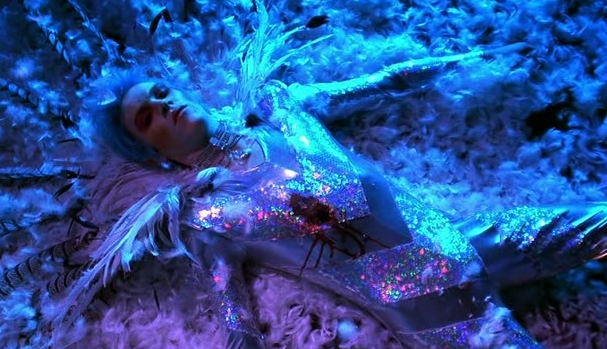Last year, David Bowie just barely made it to his 69th birthday on January 8th before dying of liver cancer on January 10th. As what would have been his 70th approaches, it feels as though Todd Haynes’ 1998 glam rock love letter, Velvet Goldmine, has finally been vindicated for its campiness–at the time of its release, merely deemed “bad” and a box office failure. While, for some, it’s hard to believe that this same director would go on to direct the likes of Far From Heaven and Carol, and yet, it also feels like a natural trajectory from Haynes’ bold portrayal of homosexuality at a time when it was unheard of.
Originally intended as a biopic of Bowie’s life, Haynes was forced to recalibrate his script when the former threatened to sue. Though Haynes made many changes, the overt similarities to Bowie’s life cannot be denied. From the subtleties of his band name, Venus in Furs, nodding to both Lou Reed himself and Bowie’s glammed up band name, The Spiders From Mars, to the overtness of his alter ego name being Maxwell Demon (though probably still no match for Ziggy Stardust if things came to a battle), Velvet Goldmine, well, mines just about all it can out of Bowie’s outrageous personal and stage life–with a touch of Marc Bolan and Oscar Wilde thrown in for good measure. In fact, Oscar Wilde is who the film commences with as a title card reading Dublin, 1894 hones in on a baby with a shiny emerald-tone pin left on a doorstep (by aliens, obviously). That baby later turns out to be Oscar, the only child in his class willing to admit he wants to be a pop star. It is thus, that Wilde brings about the glam rock movement in the next century, as we’re brought to the year 1984 in London, where Brian Slade (Jonathan Rhys-Meyers) has just prophesied his own onstage assassination only to take the stage in giant angel wings and a glittering jumpsuit (there’s a reason costume designer Sandy Powell was nominated for an Oscar for this film) and have it actually come to fruition. Ten years later, in 1994, it is revealed to the audience that Slade’s death was a hoax engineered by the singer. One of his devoted fans and acolytes, Arthur Stuart (Christian Bale), who witnessed the “assassination,” is now a journalist who has been enlisted by his editor to do a piece on Slade for the ten year anniversary figuring out what actually happened to the now untraceable rock star.
Reluctant to take on the assignment because of how much of this period in his life represents the stifling of his homosexuality, Arthur also has difficulty in resisting the desire to get nostalgic about the era of rock that at last made him see he wasn’t the only bloke with feelings for other men. With its Citizen Kane-inspired structure (another very glam rock element of Velvet Goldmine), Arthur’s interviews are conducted with different key people throughout Slade’s life, thereby commencing a flashback to that particular phase of his career. Starting with his first manager, Cecil (Michael Feast), who first saw Brian in a nightclub introduced to the stage by his wife, Mandy (Toni Collette, channeling Sharon Stone in Casino), it’s easy to see that Brian was always going to take what he could from someone and then move on. While under Cecil’s management, he plays one of his first festival gigs in a dress, booed to oblivion for doing so. But it is at the same festival that he first encounters the influential stage presence of Curt Wild (Ewan McGregor), a visceral, hyper-sexed performer channeling parts Iggy Pop and Lou Reed (though definitely more the former), both of whom collaborated with Bowie at fledgling times in their careers. The only difference in Haynes’ rendering of the rapport is that it is love at first sight for Slade–which also brings in the theme of being enamored of someone for their raw talent more than anything else, unable to separate the persona from the actual person.
With Oscar Wilde a constant presence throughout the film, Haynes interweaves some of the aphorist’s lines into the mouth of Slade, who removes himself from feeling culpability by telling his ever-further-from-his-thoughts wife: “What is true about music is true about life: that beauty reveals everything because it expresses nothing.” Though Mandy has tolerated a lot since meeting him on New Year’s Eve of 1969 with another grandfather of glam rock, Jack Fairy (Micko Westmoreland), she draws the limit at him falling in love with Curt. It’s an infidelity of the next caliber, after all.
With the glam rock scene unraveling by the end of the 70s, Curt and Brian’s professional relationship, too, suffers a blow and, in turn, so does their tumultuous affair. Sans the emotional buffering of both Mandy and Curt, it’s only natural that Brian would turn to drugs, a common crutch for fame, which was all Brian ever wanted anyway. It’s essentially that superficial. Because, like another quote borrowed from Wilde and used by Brian, “A real artist creates beautiful things and puts nothing of his own life into them.” Thus, he has no room to care too much about people, or using them for his songs and performances.
Even with this coat of shallowness, Velvet Goldmine, more than just a visual masterpiece that never stops fucking the eyes, is a statement on what the glam rock genre did for those struggling with their sexuality, or desperately in search of others “like them”–which is why so much of the focus of the film is on Arthur, who viewed glam rock as an assurance about his identity. It was a moment in time that was perhaps the first major step in making homosexuality “mainstream.” And this is surely a part of the Bowie legacy that David Jones could be proud of.





















